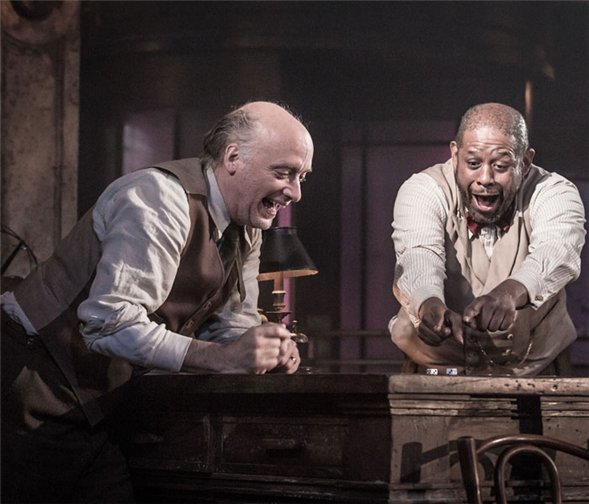Translate Page

Frank Wood plays him in the Broadway revival
---
Welcome to Building Character, our look at how actors create their roles
Eugene O'Neill's Hughie has some of the American theatre's most interesting stage directions. While almost all of the spoken lines in this short play are given to Erie Smith, a gambler and con man trying to fool suckers in New York City in 1928, the stage directions describe the inner life of Charlie Hughes, the desk clerk at the run-down hotel where Erie lives. Reading the script, we learn about Charlie's wife, his health, his dying dreams, and his imaginary conversations with the firemen, ambulance drivers, and city dwellers who travel past the hotel in the middle of the night.
But if we're not reading the script – if we're simply watching the play on stage – Charlie remains a mystery. While Erie blusters and brags about his supposedly glorious life on the streets, the desk clerk is almost totally still, barely moving from the hotel desk. We never learn about the fantasies flickering through his mind.
The actor playing Charlie has to suggest them anyway. That's what makes Frank Wood's performance so compelling in the current Broadway revival of Hughie, which is now in previews at the Booth Theatre. While Forest Whitaker, as Erie, stalks the hotel, trying to outrun his loneliness with his never-ending chatter, Wood remains poised and alert. He doesn't need to say much to make it clear that he's alive, that something is going on in his mind. His energized reticence becomes a counterpoint to Whitaker's bravado.
Wood couldn't craft his performance without O'Neill's stage directions. "This is what actors seek in rehearsal and in preparation for a performance," he says. "In any play, they're using the script all the time to say, 'Where is my life? It's not just in what I'm saying.' O'Neill, unusually, suggested where I could fill my life in. It's amazing."
In early rehearsals, Wood focused on descriptions of Charlie's physicality, including lines like "the Night Clerk feels that he has been standing a long time and his feet are beginning to ache" and "the Night Clerk seems turned into a drooping waxwork." Considering how still the character remains throughout the play, it was helpful to give that stillness a texture. Or at least, it was helpful for a while. "Initially I tried to overtly embody those things, like leaning on the desk to take support off his aching feet," Wood says. "But at a certain point, I said, 'I think I may be missing some things.' The part is so still that I began to think, 'What is active about this guy? Let's assume stillness and start to work on other stuff."
{Image1}
That's when he got invested in Charlie's flights of fancy, like when he imagines asking a passing fireman if a nearby blaze will be big enough to burn the whole city to the ground. "He takes those trips in his head, and I just add more trips," the actor explains. "Most of it has to do with sounds in the street, and the sound designer for this show has created street sounds pretty faithfully. I let them be cues for where my thoughts go. My thoughts are a combination of escaping and fantasizing about the end of things, about things dying and leaving this world."
But with all those thoughts running through his head, does Wood have time to interact with Whitaker? Do the actors – and their characters – make a connection? "That's the tension," Wood says. "How badly does he need me to listen? Or how badly does he need to believe I'm listening? The more I can get away with not listening – and the audience seeing I'm not listening – the more you hear the story of how badly Erie needs to be listened to."
As the co-stars continue to calibrate their relationship on stage, Wood is reflecting on how meaningful it is when the night clerk and the gambler really do hear one another. "It's absolutely a moment of grace," he says. "And the gambling as a metaphor is beautiful because it means a chance. It's not an absolute certainty. It's not redemption. But in this world, Erie comes back to have a chance because he's found this person who can listen. He's found his familiar."
---
Follow Mark Blankenship at @IAmBlankenship. Follow TDF at @TDFNYC.
Photos by Marc Brenner. Top photo: Frank Wood and Forest Whitaker.
TDF Members: Click here to browse our current discounts for theatre, dance, and concerts.